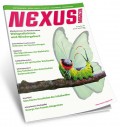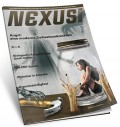 Erinnern Sie sich noch, wie Sie Ihren ersten Rechner angeschmissen oder die erste E-Mail versendet haben? 30 Jahre später leben wir im digitalen Zeitalter, und die Konzerne, die mit der Technikrevolution groß geworden sind, basteln an einer Welt, in der ein Großteil unseres Lebens von Maschinen und Algorithmen bestimmt wird.
Erinnern Sie sich noch, wie Sie Ihren ersten Rechner angeschmissen oder die erste E-Mail versendet haben? 30 Jahre später leben wir im digitalen Zeitalter, und die Konzerne, die mit der Technikrevolution groß geworden sind, basteln an einer Welt, in der ein Großteil unseres Lebens von Maschinen und Algorithmen bestimmt wird.
Das gilt auch für die Auswahl von Nachrichten und die Frage, welche Informationen es wert sind, auf die Welt losgelassen zu werden. Ein Blick hinter die Kulissen der Medienkonzerne zeigt: Auch hier ist schon alles vernetzt. Das an sich wäre ja nicht verwerflich, würde sich Big Tech nicht als Hüter der Wahrheit aufspielen. Ein warnender Entflechtungsversuch.
 Druckansicht
Druckansicht
Endnoten
- „In Teilen“, da Orwell gemischte Gefühle gegenüber seinem Arbeitgeber hegte. Siehe Lynskey, D.: „The Ministry of Truth: A Biography of George Orwell’s 1984“ (London: Pan Macmillan, 2019)
- Bagdikian, B.: „The New Media Monopoly“ (Boston: Beacon Press, 2004)
- Noam Chomsky folgerte beispielsweise, dass die Medien sich als liberal bezeichnen und damit die Grenzen des Debattenraums festlegen. Wer aber über den Liberalismus hinaus nach links abweiche, verstieße gegen die von den Massenmedien gesetzten sozialen Normen.
- Eins von vielen Beispielen: Anderson, S. et al.: „Discrete Choice Theory of Product Differentiation“ (Cambridge: MIT Press, 1992)
- Der Begriff wird häufig zur Beschreibung von Sekten verwendet, gilt aber auch allgemein. Vgl. Lalich, J.: „Bounded Choice: True Believers and Charismatic Cults“ (Oakland: California, 2004)
- Taibbi, M.: „Hate, Inc.: Why Today’s Media Makes Us Despise One Another“ (New York: OR Books, 2021)
- Jenik, C.: „The Most Popular Paid Subscription News Websites“, Statista.com, 10.05.2021, https://tinyurl.com/yf85ddly
- Gurdus, L.: „CEO of holding company behind Vimeo, Daily Beast shares why he thinks it’s undervalued“, CNBC.com, 07.02.2019, https://tinyurl.com/ydfjzdtm
- Ha, A.: „BuzzFeed acquires HuffPost“, TechCrunch.com, 19.11.2020, https://tinyurl.com/yh3qzxsw
- Finley, A.: „How the CIA Forgot the Art of Spying“ in Politico Magazine, März-April 2017, https://tinyurl.com/yzts9nop
- Wiedeman, R.: „A Company Built on a Bluff“ in New York Intelligencer, 10.06.2018, https://tinyurl.com/yk5ejk68
- Vgl. Coles, T. J.: „Real Fake News“ (Red Pill Press, 2018)
- Singh, M.: „Wikipedia now has more than 6 million articles in English“, TechCrunch.com, 24.01.2020, https://tinyurl.com/tdvmu98
- „63 Fascinating Google Search Statistics“, Bluelist.co, https://tinyurl.com/yzqhmwqf
- Taplin, J.: „Forget AT&T. The Real Monopolies Are Google and Facebook“ in New York Times, 13.12.2016, https://tinyurl.com/huc357d
- Lewis, S. und Nechushtai, E.: „Google News Searches Aren’t Politically Biased, but They Do Like Mainstream Media“, LiveScience, 31.08.2018, https://tinyurl.com/yz2fmwr8
- Parikh, R.: „How To Bounce Back From The Google Fred Algorithm – And Prepare For Future Updates, Forbes Agency Council“ inForbes, 05.10.2017, https://tinyurl.com/yfsptk6y
- Kollibri Terre Sonnenblume: „Cowardly New World: Alternative Media Under Attack by Algorithms“, CounterPunch.org, 26.10.2017, https://tinyurl.com/ygqpxj42
- Damon, A. und Niemuth, N.: „New Google algorithm restricts access to left-wing, progressive web sites“, WSWS.org, 27.07.2017, https://tinyurl.com/yczxy254
- „dontbeevil“, PDF des Google-Whistleblowers Zach Vorhies, https://tinyurl.com/szt2vrbk, S. 566
- Ebd., S. 567
- Reuters: „Google parent Alphabet and U.K. pharmaceutical firm to create company focused on fighting diseases“, 01.08.2016, https://tinyurl.com/yjysmdct
- Wikimedia Foundation: „Benefactors“, https://tinyurl.com/kea3r42x
- Dorsey, J., United States Senate, Committee Hearing Chamber: „Breaking the News: Censorship, Suppression and the 2020 Election“, Committee on the Judiciary, 17.11.2020, https://tinyurl.com/r4fmxm2m
- Madki, V.: „Exponential Growth of Telegram Over the Years“, StartupTalky.com, 13.03.2021, https://tinyurl.com/yhhrxj39
- Majid, A.: „Top 50 news websites in the world for March 2021: Times and Telegraph two fastest growers“ in Press Gazette, 22.04.2021, https://tinyurl.com/yepnpq38
- MyWikiBiz: „Directory:Wikimedia Foundation secret donor list“, https://tinyurl.com/p86cb9cb
- Lee, S. et al.: „The 21st Century Meeting and Event Technologies: Powerful Tools for Better Planning, Marketing, and Evaluation“ (Ranton: CRC Press, 2017), S. 184
- WikiStats: „Wikipedia:Size comparisons“, Stand: Sommer 2021, https://tinyurl.com/yffnqe4r
- CBS This Morning: „Meet the man behind a third of what’s on Wikipedia“, 26.01.2019, https://youtu.be/JhNczOuhxeg
- Eshleman, T.: „Steven Pruitt ’06: Wikipedia’s most prolific editor“ in William and Mary Alumni Magazine, 29.10.2018, https://tinyurl.com/yg9qpcnd
- „The 25 Most Influential People on the Internet“, TIME.com, 26.06.2017, https://tinyurl.com/yjz3oj9w
- Zeeshan Jhandir, M. et al.: „Controversy detection in Wikipedia using semantic dissimilarity“ in Information Sciences, 2017, 418(419):581–600
- van Dijck, J.: „The Culture of Connectivity: A Critical History of Social Media“ (Oxford University Press, 2013), S. 132
- Ebd., S. 136
- Ebd., S. 138
- Ebd.
- Zitiert ebd., S. 136–137
- Zitiert in Livingstone, R.: „Immaterial Editors: Bots and Bot Policies across Global Wikipedia“ in Fichman, P. und Hara, N. (Hrsg.): „Global Wikipedia: International and Cross-Cultural Issues in Online Collaboration“ (Lanham: Rowman & Littlefield, 2014), S. 10
- DBpedia: „About DBpedia“, https://tinyurl.com/jz7yvnkb
- Starke, E.: „10 years ago DBpedia decided to join the Google Summer of Code program“, DBpedia Blog, 23.06.2021, https://tinyurl.com/yf5u675o
- NewsLabs: „The Juicer“, BBCNewsLabs.co.uk, https://tinyurl.com/vkn99t3f
- Zitiert in Reuters: „Reuters News Tracer: Filtering through the noise of social media“, https://tinyurl.com/yhltqe2f
- Ebd.
- New York Times Labs: „Editor (2015)“, https://bit.ly/3hGMgsA
- WashPost PR Blog: „The Washington Post tests new ‚Knowledge Map‘ feature“, WashingtonPost.com, 16.07.2015, https://tinyurl.com/yh2x9ktf
- Ponsford, D.: „Google funds Press Association robot reporter project which will write 30,000 local news stories a month“ in Press Gazette, 06.07.2017, https://tinyurl.com/yjdnebyb
- Ebd.
- Facebook AI: „Here’s how we’re using AI to help detect misinformation“, 19.11.2020, https://tinyurl.com/yhxhvsgf
- Marr, B.: „Artificial Intelligence Can Now Write Amazing Content -- What Does That Mean For Humans?“ in Forbes, 29.03.2019, https://tinyurl.com/yg2tfy3q
- Walker, J.: „‚We were wrong‘: US news rating tool boosts Mail Online trust ranking after talks with unnamed Daily Mail exec“ inPress Gazette, 31.01.2019, https://tinyurl.com/yzg33nhc


 Erinnern Sie sich noch, wie Sie Ihren ersten Rechner angeschmissen oder die erste E-Mail versendet haben? 30 Jahre später leben wir im digitalen Zeitalter, und die Konzerne, die mit der Technikrevolution groß geworden sind, basteln an einer Welt, in der ein Großteil unseres Lebens von Maschinen und Algorithmen bestimmt wird.
Erinnern Sie sich noch, wie Sie Ihren ersten Rechner angeschmissen oder die erste E-Mail versendet haben? 30 Jahre später leben wir im digitalen Zeitalter, und die Konzerne, die mit der Technikrevolution groß geworden sind, basteln an einer Welt, in der ein Großteil unseres Lebens von Maschinen und Algorithmen bestimmt wird.
Kommentar schreiben